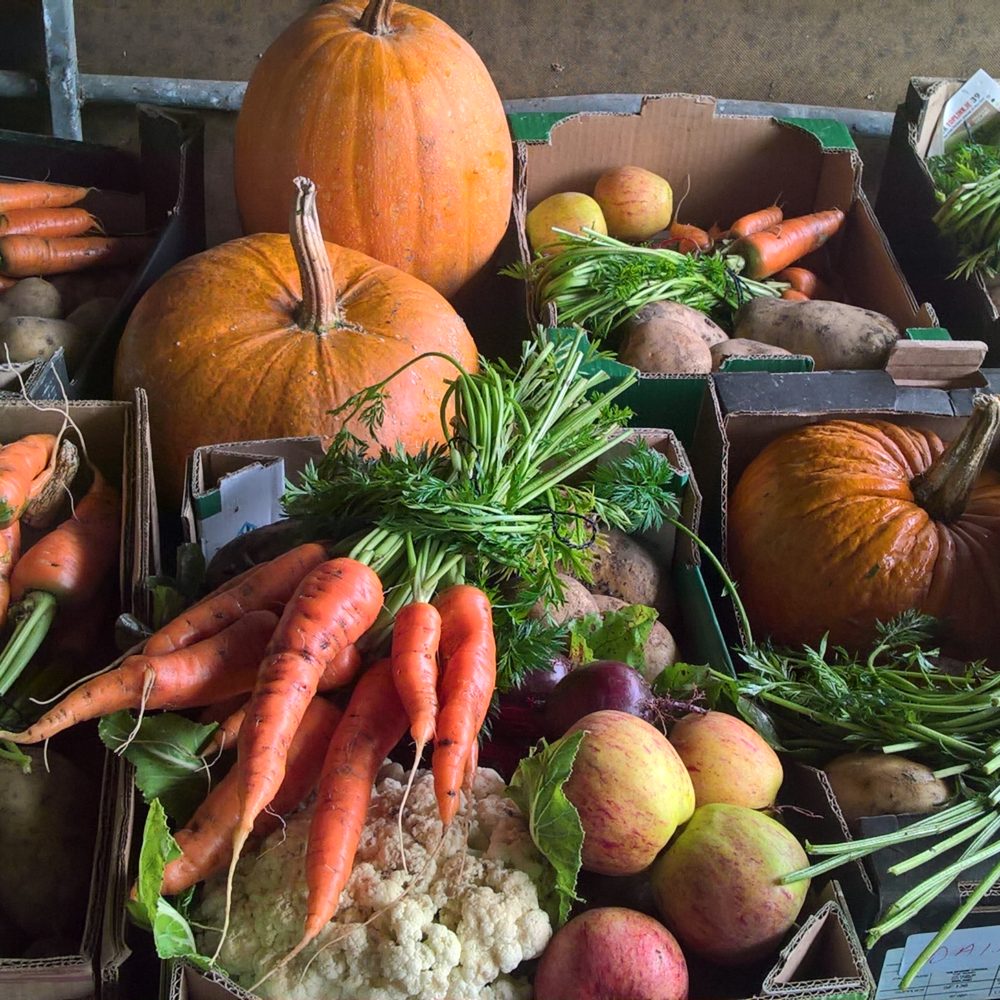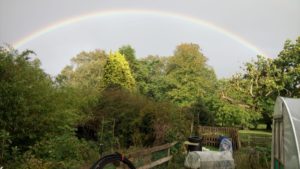

The following is an excerpt from a sermon Jeremy delivered at the annual Church of Ireland Harvest Services in St. Brigid’s Church, Ballintubbert and Athy.
Charis Garden is a space of about 2/3 of an acre and situated in Ballyadams. Out of it, we have developed a small scale market garden that is now supplying a regular veggie box to between 10 and 15 local homes between Ballyadams, Athy and Stradbally. We fill the boxes with whatever seasonal produce the garden yields on any given week.
I want to tell you more about our garden. But, before I do, I want to dip into the Big Story of Scripture – because apart from that story, it is hard to grasp what Charis Garden is really all about.
The Big Story
And the Lord God planted a garden in Eden…
These are the words of Genesis 2.8. Right at the beginning of the Bible story – after God has created the heavens and the earth, and fashioned Adam and Eve – we read that God set about creating a garden.
And the Lord God planted a garden in Eden, in the east, and there he put the man whom he had formed. And out of the ground the Lord God made to spring up every tree that is pleasant to the sight and good for food. The tree of life was in the midst of the garden, and the tree of the knowledge of good and evil…
And so we begin with a garden: the Bible’s sweeping narrative unfolds from here. It’s what we might call the Big Story: the catastrophic Fall, the tragic loss of Eden, the marring of the world through sin and hate – and, in the midst of this unfolding story, the loving determination of God to restore what has been lost.
Throughout the Hebrew Scriptures, we hear God speak through his prophets. And often in the imagery of the garden. For example, in Isaiah 27, he likens his people Israel to a vineyard:
A pleasant vineyard, sing of it!/I, the Lord, am its keeper;/Every moment I water it./Lest anyone punish it,/I keep it night and day./Would that I had thorns and briers to battle!…/In days to come Jacob shall take root,/Israel shall blossom and put forth shoots/And fill the whole earth with fruit.
Elsewhere, in Isaiah 51, he declares –
For the Lord comforts Zion;/He comforts all her waste places/And makes her wilderness like Eden;/Her desert like the garden of the Lord.
This green-fingered God describes the salvation he will bring to his people. He promises nothing less than cosmic rescue. The loss of Eden will be reversed. Creation, until now knotted with the thorns of evil, will finally be restored.
And by the time we meet Jesus – God made flesh and bone, walking on the earth he made – we hear him speak in garden images. He speaks of good soil, bad soil, hard soil; he speaks of thorns, wheat and tares; he speaks of sparrows, mustard seeds, trees and flowers; he speaks of fields and vineyards. He spins stories – filled with garden images – to illustrate the reality of his Kingdom.
And on the night of his betrayal, as the cross looms, we find him on his knees, sweating blood in the Garden of Gethsemane.
And, on the dawn of resurrection, who is the first to meet him? Mary Magdalene.
And what does she mistake him for? A gardener.
This is how John tells it in his Gospel:
But Mary stood weeping outside the tomb, and as she wept she stooped to look into the tomb. And she saw two angels in white, sitting where the body of Jesus had lain, one at the head and one at the feet. They said to her, ‘Woman, why are you weeping?’ She said to them, ‘They have taken away my Lord, and I do not know where they have laid him.’ Having said this, she turned and saw Jesus standing, but she did not know that it was Jesus. Jesus said to her, ‘Woman, why are you weeping? Whom are you seeking?’ Supposing him to be the gardener, she said to him, ‘Sir, if you have carried him away, tell me where you have laid him, and I will take him away.’ Jesus said to her, ‘Mary.’ She turned to him and said to him in Aramaic, ‘Rabboni!’ (which means Teacher).
There are no throwaway details in Scripture. John is telling us the Lord has returned from the thorny chaos of death. The resurrection of Jesus is proof-positive that God has followed through on all of his promises to save a world despoiled by evil
The gardener is not finished. He has returned, and he will finish his work.
As the Book of Revelation, the final book of the Bible, closes, we are no longer in the company of a single couple, surrounded by a bucolic paradise of exotic creatures. Eden is no longer a garden but a garden-city, peopled with all the nations of the world.
And the city has no need of sun or moon to shine on it, for the glory of God gives it light, and its lamp is the Lamb. By its light will the nations walk, and the kings of the earth will bring their glory into it, and its gates will never be shut by day – and there will be no night there. (Rev. 21.23-24)
And so John brings us to a close. The symbolic language strains to communicate the incommunicable. But one thing is clear: God has been faithful to all his promises. The lost garden has been restored. We are dwellers of his garden-city, his presence is our light.
Charis Garden
So much for the Big Story. So much for hope in anticipation of the garden renewed. But what about the present realities of a torn and broken world? As Paul writes in his letter to the Romans, creation groans – not least because of the rampant environmental destruction caused by human greed.
And in fact, it is Paul, in a roundabout way, who brings us back to Charis Garden. For the name of our garden comes from the Greek word χαρις (charis) that he uses in so many of his letters.
The meaning of charis is ‘grace’, the loving-kindness of God. It also connotes joy, pleasure and thanksgiving. It occurs 155 times in the NT. And Paul opens many of his letters with the greeting, ‘Grace (charis) to you and peace from God our Father and the Lord Jesus Christ.’ (Romans 1.7)
Paul’s letters call Christian communities in every age to persevere, to cultivate love in the midst of long-suffering; the patient garden-work of genuine discipleship. But it all begins with charis, with grace. It begins with who God is, and what he has already done for us in his Son, Jesus Christ.
And so Charis Garden is the name we chose for our garden. Our vision is threefold. Each aspect begins with an S: Soil, Soul and Solace. We want to bring these three strands together – tending the land (Soil), ministering to others (Soul) and providing a space of shelter and comfort, where appropriate, to those who may need it (Solace).
In the Big Story ofScripture, we glimpse God’s commitment to his creation. He does not abandon the beleaguered earth. Instead, he loves and restores what is lost and broken. Somehow, in some small way, we hope Charis Garden reflects the Big Story: God’s way of loving the earth and everything in it. We hope the garden space, and the food it provides, will be a blessing to those who partake…
